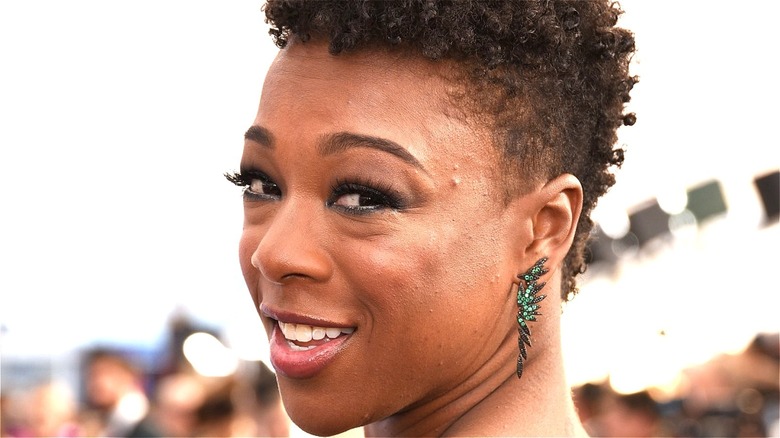The Real Reason Samira Wiley Left Orange Is The New Black
"Orange Is The New Black" was one of the first Netflix original series to go viral. The prison drama, based on Piper Kerman's novel of the same name, chronicles the lives of women behind bars. The streaming series centers on Piper's experience as a wealthy white woman incarcerated for a crime committed years prior. She completely transforms from the woman she is upon entering prison throughout the show's seven seasons due to the nature of politics within the women's prison, which centers around the intersections between race, sexuality, gender, socioeconomic background, and education.
"Orange Is The New Black" is an Emmy-winning series, and it's the outstanding characters and the performances that bring those characters to life to thank for its success. Taylor Schilling plays a fictional version of Kerman, and, through her, we meet several inmates, including Tasha "Taystee" Jefferson (Danielle Brooks), Tiffany "Pennsatucky" Doggett (Taryn Manning), Suzanne "Crazy Eyes" Warren (Uzo Aduba), Nicky Nichols (Natasha Lyonne), Galina "Red" Reznikov (Kate Mulgrew), and more. But there is one character from the hit show who left a lasting mark, partially due to the circumstances of her heartbreaking exit from the series.
Samira Wiley starred as the always-positive Poussey Washington in more than 50 episodes of "Orange Is The New Black" (via IMDb). Season 4, Episode 12, "The Animals," is a game-changing episode because it ends with her wrongful death at the hands of a police officer, which later incites riots at Litchfield. The circumstances of Poussey's death, as well as the imagery used to depict it, mirror traumatic real-life events. As a result, this TV moment sparked a conversation around race and police violence onscreen (via Mic). In the end, Poussey's death came as a shock, and it wasn't easy for the cast or show's creator to say goodbye.
The death of Poussey had 'the greatest impact,' per OITNB's creator
In June 2017, "Orange Is The New Black" creator Jenji Kohan addressed Poussey's shocking exit in Season 4. She spoke with The Hollywood Reporter about the "difficult" decision to kill Samira Wiley's character. "I hated losing Samira, but her death would have the greatest impact," Kohan remarked. She also revealed that the other stars of the series "got nervous and were outraged" by the news. "They're enmeshed with their characters as well, and you try to separate the actor from the part of the writer from the material, but it gets mushy sometimes," she explained.
Wiley may have accepted the decision for Poussey to exit the "Orange Is The New Black" story, but, as she told the New York Post almost a year earlier in August 2016, it definitely wasn't her idea to leave. When she first learned of Poussey's fate, "The Handmaid's Tale" actor described her emotions as "devastated," "shocked" and "confused." She went on to tell the New York Post that first learned of her character's death a year before everyone else, so she said it was hard to process while not being able to talk to her co-stars about it. "I'm with these women all day, every day, and this is something that will affect their lives as well," she explained.
Despite her acceptance, Wiley said she was not ready to leave "Orange Is the New Black." However, she was "grateful" for the work she did on the show. She shared, "There's no hard feelings or anything like that. I'm happy with what I made with [creator] Jenji [Kohan] and the relationship I have with her."
If anything, Kohan's reluctance to kill off Poussey just goes to show how powerful her death really was, as the character's pure intentions and peaceful nature left a lasting impact on fans. With the benefit of hindsight, we now know that Poussey's death in Season 4 is not the last time she appears on the show. Wiley would reprise the character twice: once in the Season 5 episode "Flaming Hot Cheetos, Literally," and once in the Season 7 episode "The Big House."

